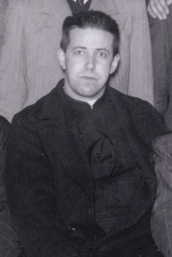Alberto Hurtado
| St. Alberto Hurtado, S.J. | |
|---|---|

San Alberto Hurtado
|
|
| Born |
January 22, 1901 Viña del Mar, Chile |
| Died | August 18, 1952 (aged 51) Santiago, Chile |
| Venerated in | Roman Catholic Church |
| Beatified | October 16, 1994, Vatican City by Pope John Paul II |
| Canonized | October 23, 2005, Vatican City by Pope Benedict XVI |
| Feast | August 18 |
| Attributes | Jesuit robes, an old green van |
| Patronage | Chile, poor people, street children, social workers, and is also known as a class patron in Xavier School |
Saint Alberto Hurtado Cruchaga, S.J. (born Luis Alberto Hurtado Cruchaga on January 22, 1901 in Viña del Mar, Chile – August 18, 1952 in Santiago, Chile), popularly known in Chile as Padre Hurtado (Spanish: Father Hurtado), was a Chilean Jesuit priest, lawyer, social worker and writer of Basque origin, founder of the Hogar de Cristo foundation. He was canonized on October 23, 2005, by Pope Benedict XVI, becoming his country's second saint.
Alberto Hurtado Cruchaga was born in Viña del Mar, Chile, on 22 January 1901; after the death of his father when Alberto was four years old, his mother had to sell, at a loss, their modest property in order to pay the family’s debts. As a further consequence, Alberto and his brother had to go to live with relatives and were often moved from one family to another. From an early age, he experienced what it meant to be poor, and without a home.
Thanks to a scholarship, he managed to study at the prestigious all-boys Jesuit school of St. Ignacio, Santiago (1909–17). During this time, he volunteered at the Parroquia Nuestra Señora de Andacollo, a Catholic parish and school in a poor neighborhood of Santiago.Fernando Vives who was schoolteacher at the St. Ignacio school was one the greatest influences on Hurtado. During Vives exile in Spain (1918–1935) they held correspondence. At the parish and school, he assisted in the office and was librarian. From 1918 to 1923, he attended the Pontificia Universidad Católica de Chile, studying in its law school and writing his thesis on labour law. Obligatory military service interrupted his studies, but once he fulfilled this duty he went on to earn his degree early in August 1923.
...
Wikipedia
